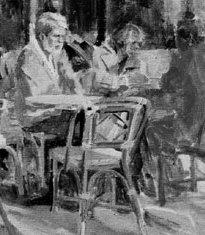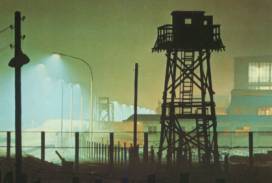Le Boulevardier
Ah, what a pleasant surprise! How long has it been? Please, asseyez-vous, as they say. What brings you to the boulevard, aside from the pleasant weather? You must tell me all about what you've seen and heard.
About Me

- Name: Le Boulevardier
- Location: Along the boulevard of earthly delights, France
A gentleman of leisurely pursuits lounging beside the boulevard of life, lost in his own reveries and observing others pursue their dreams or flee their nightmares.
Monday, May 29, 2006
Lest We Forget
Last night I watched a Memorial Day segment on the television program 60 Minutes which left me with very ambiguous feelings. The episode featured U.S. soldiers who had been severely wounded in the conflict in Iraq. It showed how, despite their severe wounds, they were able to return to lives filled with futures, largely through their own pluck and courage.
Though I sympathized with the soldiers’ plights I could in no way share in the kind of soldierly zealotry they displayed toward a war which had robbed them of their limbs and minds. All these individuals, save one, could have served as poster children for the militaristic adventurism of the current administration.
One stated that the conflict in Iraq is justified simply because the President says we have to be there. Another went so far as to say that she believes herself to be a better person after having a major portion of her brain removed. Yet another’s biggest regret about having his left arm blown off by a rocket propelled grenade was the realization that he would have to leave his comrades in arms. While I think it a great mercy that none of these individuals will face the sort of bleak future of disabled veterans from other conflicts, as portrayed by Georges Grosz in his drawing The Hero, I can’t escape the conviction that this select group of individuals represents the very fortunate few. The lottery winners of veterans, if you will. In the background, away from the cameras, are thousands whose futures are filled with broken marriages, unemployment, and marginalization. For some the future only holds the ward of a VA hospital.
While I think it a great mercy that none of these individuals will face the sort of bleak future of disabled veterans from other conflicts, as portrayed by Georges Grosz in his drawing The Hero, I can’t escape the conviction that this select group of individuals represents the very fortunate few. The lottery winners of veterans, if you will. In the background, away from the cameras, are thousands whose futures are filled with broken marriages, unemployment, and marginalization. For some the future only holds the ward of a VA hospital.
At the end of the program Andy Rooney, whom I respect as a humane and sensible individual, made some obligatory remarks regarding the meaning of Memorial Day. I thought it meet to point out that those whom we memorialize on this day did not give their lives. Rather, their lives were taken from them. No one goes into combat with the intention of dying or suffering grievous wounds.
I had to disagree with Rooney’s observation that war, sadly, brings out the most instances of courage in human beings. It doesn’t take courage to die or be wounded in war. It only takes being in the wrong place at the wrong time. And in the case of war, that’s all the time. For all the instances of apparent courage found in warfare, there are just as many instances of cowardice and perverse cruelty.
Warfare simply brings out the worst in human behavior. In point of fact the mundane routine of civilian affairs contains far many more instances of true courage. The firefighters, the ordinary cops, the EMS respondents, the strangers who run into burning buildings to look for those in danger, or who run to accidents to aid those who may need help. These are the individuals who display true courage. Because they choose to act selflessly despite the assuredness of peril. Not simply because someone ordered them to do so.
On this Memorial Day let us remember the misery and horror wrought by warfare. Let us not celebrate it as an occasion to display the best in human nature.
Sunday, May 14, 2006
Die Wacht Am Rio

“Dearest nephew; Undoubtedly you’ve heard or read of plans by the leadership of this splendidly spacious and un-crowded land to deploy a military presence along the border to the south.”
Hm! Just like my uncle. Avuncular to a fault! A bit terse and to the point, though. But why just the border to the south? Perhaps they face a formidable armed menace.

“This is to supplement the existing force of 10,000 officers whose actual job it is to patrol the border. The multi-million dollar steel fence has proven inadequate to hold back the tide of poor and unemployed seeking to make a better life for themselves and their families, much as the progenitors of those who are already here once did.”
“As the good book says: You feast before the multitude, yet you expect them to only watch? Okay, perhaps it isn’t in the good book. But it might be. It’s a big book, that good book.”
“It seems that technology and the extra-legal zeal of posse and paramilitary militias have proven inadequate to the task. Now the Gang of Four find it necessary to sanction a military presence along the border.”
“You know my feelings regarding borders of any kind. I regard them as the futile, feudal response of fearful societies. The separation of human beings from each other through the expedience of borders is arbitrary, short-lived, and has been the basic source of conflict between people for millennia.”
 “And, of course, they never work. From the Great Wall to the Maginot Line to the Atlantic Wall to the Berlin Wall. What remains of them but mere curiosities? Testimonies to quaint and outmoded ideas.”
“And, of course, they never work. From the Great Wall to the Maginot Line to the Atlantic Wall to the Berlin Wall. What remains of them but mere curiosities? Testimonies to quaint and outmoded ideas.” “I’m certain that in your reading you’ve come across photographs of East German border guards, machine guns at the ready, gazing at the camera from concrete guard towers through binoculars. The photos invariably bear a caption to the effect ‘THEM LOOKING AT US LOOKING AT THEM.’.

Well, now we have become the THEM Just as we had already become the joyous tank crews rolling across the countryside, so reminiscent of archival news footage of the Blitzkrieg.”
“We are no longer the good guys. We are no longer the beleaguered and brave fighters battling overwhelming odds in a conflict we never wanted. That’s the image our leaders try to foster in our minds to support their imperialist agenda. But it’s a lie! And it’s needlessly costing us lives and the trust and esteem of the rest of the world. Furthermore, these policies and the lies used to support them only serve to give credibility to the position of those who would truly wish to do us harm.”
“Anyway, I hope this letter finds you in good health. Write me in care of your aunt Mathilde when you can. I don’t want them to know where I live, you understand.”
“My warmest wishes, your Uncle.”
“P.S.: You know I hold similar views on censorship and any authoritarian attempts to deprive individuals of the freedom to make choices. Laws, when necessary, should enable and not restrict human behavior.”
Well. I’m glad he made that clear. It’s so nice to read that he and Mathilde are still together. Especially after that sorry episode in Marrakech. But as they say, All’s well that ends. Well.
Sunday, May 07, 2006
Signs That Might Be Omens

The point of this is that the flight of birds is one of the many things I see in the world which I believe to be full of a meaning of sorts. I’m hardly a superstitious individual. And I’m certainly not religious. Yet, the more I think upon these things the more I’ve come to realize that I am an animist of sorts. The natural world is full of significant events and phenomena. Pools of still water, trees of a kind, the presence of things where they should not be. Or the absence of things where they are to be expected.
A black cat crossing my path means nothing. The song of a bird in the middle of the night does mean something. Owls generally always mean something. I mean, have you ever seen an owl actually look at you? Whew! A lone dog that stands and just looks should be watched to see which way he moves. Which really sort of makes sense, don’t you think?
In reading Plutarch’s Parallel Lives one is struck by how incredibly religious the Greeks and Romans were. They were constantly cognizant of the role of unseen forces in their lives, and busied themselves constantly in seeking to find favor with them, and to divine their meanings as manifest in the events around them.
I am of the opinion that ancient peoples were far, far more religious than any modern peoples, who seek their beliefs in books, and who distill these beliefs into obtuse systems and sets of dogmas and rites devoid of any connection to the real world.
Signs and omens are all about us. They are very personal things, and I wouldn’t trust anyone who claims to be able to read their meaning. Some very few can. But they are not the ones who say they can. Those are charlatans.
I cannot read the omens. I only know that they are all about me. To me, they fill my world with awe and wonderment. Some would call that madness, I suppose. But that’s of little consequence. The mystery of things is too vast to be diminished by such petty concerns.

